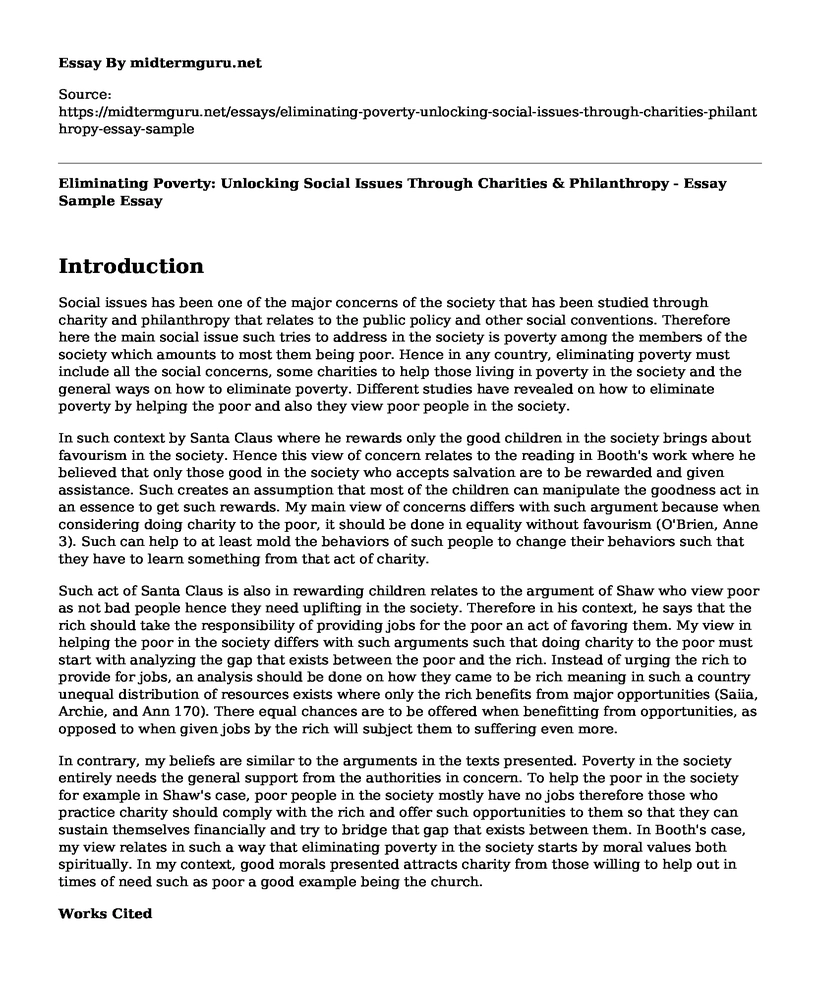Introduction
Social issues has been one of the major concerns of the society that has been studied through charity and philanthropy that relates to the public policy and other social conventions. Therefore here the main social issue such tries to address in the society is poverty among the members of the society which amounts to most them being poor. Hence in any country, eliminating poverty must include all the social concerns, some charities to help those living in poverty in the society and the general ways on how to eliminate poverty. Different studies have revealed on how to eliminate poverty by helping the poor and also they view poor people in the society.
In such context by Santa Claus where he rewards only the good children in the society brings about favourism in the society. Hence this view of concern relates to the reading in Booth's work where he believed that only those good in the society who accepts salvation are to be rewarded and given assistance. Such creates an assumption that most of the children can manipulate the goodness act in an essence to get such rewards. My main view of concerns differs with such argument because when considering doing charity to the poor, it should be done in equality without favourism (O'Brien, Anne 3). Such can help to at least mold the behaviors of such people to change their behaviors such that they have to learn something from that act of charity.
Such act of Santa Claus is also in rewarding children relates to the argument of Shaw who view poor as not bad people hence they need uplifting in the society. Therefore in his context, he says that the rich should take the responsibility of providing jobs for the poor an act of favoring them. My view in helping the poor in the society differs with such arguments such that doing charity to the poor must start with analyzing the gap that exists between the poor and the rich. Instead of urging the rich to provide for jobs, an analysis should be done on how they came to be rich meaning in such a country unequal distribution of resources exists where only the rich benefits from major opportunities (Saiia, Archie, and Ann 170). There equal chances are to be offered when benefitting from opportunities, as opposed to when given jobs by the rich will subject them to suffering even more.
In contrary, my beliefs are similar to the arguments in the texts presented. Poverty in the society entirely needs the general support from the authorities in concern. To help the poor in the society for example in Shaw's case, poor people in the society mostly have no jobs therefore those who practice charity should comply with the rich and offer such opportunities to them so that they can sustain themselves financially and try to bridge that gap that exists between them. In Booth's case, my view relates in such a way that eliminating poverty in the society starts by moral values both spiritually. In my context, good morals presented attracts charity from those willing to help out in times of need such as poor a good example being the church.
Works Cited
O'Brien, Anne. "Charity and philanthropy." Sydney Journal 1.3 (2008).
Saiia, David H., Archie B. Carroll, and Ann K. Buchholtz. "Philanthropy as strategy: When corporate charity "begins at home"." Business & Society 42.2 (2003): 169-201.
Cite this page
Eliminating Poverty: Unlocking Social Issues Through Charities & Philanthropy - Essay Sample. (2023, Jan 12). Retrieved from https://midtermguru.com/essays/eliminating-poverty-unlocking-social-issues-through-charities-philanthropy-essay-sample
If you are the original author of this essay and no longer wish to have it published on the midtermguru.com website, please click below to request its removal:
- Bullying In the Workplace - Annotated Bibliography
- Compare and Contrast Essay on Feminist Supervision and Gender Role Conflict
- Culturally Unbound: Experiences of Cross-Cultural Interaction - Essay Sample
- Annotated Bibliography on Racism and Discrimination
- Drug & Alcoholism Addiction: A Social Evil - Essay Sample
- Effects of Culture, Sexism and Stress on Maternal Experience - Paper Example
- Paper Example on Effects of Cyberbullying on the Adolescent's Health







